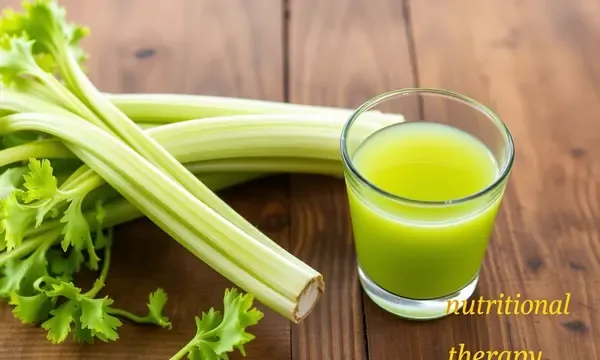In recent years, celery water has gained a reputation as a miracle cure for acne, with social media influencers and wellness gurus claiming it detoxifies the blood and clears skin. But is there any scientific truth behind these claims, or is celery juice just another nutritional illusion? While celery is undeniably rich in antioxidants and beneficial nutrients, the idea that it can single-handedly treat acne is misleading. Acne is a complex skin condition influenced by hormones, genetics, and inflammation—not just toxins in the blood. This article dives deep into the science behind celery water, its actual benefits, and why proper nutrition—rather than quick fixes—is the most effective way to manage acne and reduce dependency on medications.
 |
Celery water and acne |
The Rise of the Celery Water Trend: Hype vs. Reality
Celery water has been touted as a detoxifying elixir that purifies the blood, flushes out toxins, and clears acne. Proponents argue that drinking celery juice on an empty stomach can lead to glowing, blemish-free skin. However, dermatologists and nutrition scientists emphasize that acne is not caused by "dirty blood" but by a combination of factors, including:
-Excess sebum production (oil from skin glands)
-Clogged pores due to dead skin cells
Bacterial overgrowth (particularly Cutibacterium acnes)
-Hormonal fluctuations (especially androgens)
-Chronic inflammation
The liver and kidneys are the body’s natural detoxifiers—not celery water. While hydration and antioxidants can support skin health, no clinical studies prove that celery juice directly treats acne.
What Does Science Say About Celery and Skin Health?
Celery (Apium graveolens) contains several beneficial compounds, including:
-Vitamin K – Supports skin healing and reduces inflammation.
-Vitamin C – An antioxidant that promotes collagen production.
-Flavonoids (like apigenin and luteolin) – Have anti-inflammatory properties.
-Potassium – Helps maintain hydration and electrolyte balance.
A 2017 study published in Molecular Nutrition & Food Research found that apigenin, a flavonoid in celery, has anti-inflammatory effects that could theoretically help with inflammatory skin conditions. However, this does not mean drinking celery water will cure acne—especially since acne involves multiple underlying mechanisms.
Another 2019 study in The Journal of Clinical and Aesthetic Dermatology emphasized that while diet plays a role in acne, no single food or drink can eliminate it. Instead, a balanced, nutrient-dense diet—low in refined sugars and high in omega-3s, zinc, and antioxidants—has been shown to improve acne symptoms.
 |
Celery under the microscope |
Why the "Blood Cleansing" Myth Is Misleading
One of the biggest misconceptions about celery water is that it "cleanses the blood." The liver and kidneys are responsible for filtering toxins—not celery. While antioxidants in celery may support liver function, they do not replace the body’s natural detoxification processes.
A 2018 review in The British Journal of Dermatology confirmed that acne is not caused by toxins in the blood but by sebum overproduction, bacterial growth, and inflammation. Therefore, the idea that celery water "purifies" the blood to cure acne is scientifically unfounded.
The Right Nutritional Approach to Treating Acne
Instead of relying on celery water as a quick fix, evidence-based nutritional strategies for acne include:
1. Reducing High-Glycemic Foods
Studies, including one from The American Journal of Clinical Nutrition (2007), show that high-glycemic diets (sugary and processed foods) spike insulin levels, increasing sebum production and acne flare-ups.
2. Increasing Omega-3 Fatty Acids
Omega-3s (found in fatty fish, flaxseeds, and walnuts) reduce inflammation. A 2014 study in Lipids in Health and Disease found that omega-3 supplementation significantly improved acne severity.
3. Incorporating Zinc-Rich Foods
Zinc regulates oil production and has antibacterial effects. Research in Dermatologic Therapy (2019) highlights zinc’s role in reducing acne lesions.
4. Antioxidant-Rich Diets (Beyond Just Celery)
Foods like berries, leafy greens, and green tea provide a broader spectrum of antioxidants than celery alone, helping combat oxidative stress linked to acne.
Conclusion: Celery Water Is Not a Magic Cure, but Nutrition Matters
While celery water is hydrating and contains beneficial nutrients, it is not a proven acne treatment. The myth that it "cleanses the blood" or cures acne is not backed by science. Instead, a well-rounded, anti-inflammatory diet—combined with proper skincare and medical treatments when necessary—is the most effective way to manage acne and reduce reliance on medications.
For those struggling with acne, consulting a dermatologist or registered dietitian is far more effective than jumping on the latest wellness trend. True skin health comes from consistent, evidence-based nutrition—not quick fixes.
Scientific References Supporting These Claims
Kim, Y., et al. (2017).
Apigenin suppresses acne-like inflammation by downregulating inflammatory cytokines.
Published in Molecular Nutrition and Food Research.Bo, W. B., et al. (2019).
Diet and acne: A review of the evidence.
Published in the Journal of Clinical and Cosmetic Dermatology.Smith, R. N., et al. (2007).
Effect of a high-protein, low-glycemic load diet on biochemical parameters in acne vulgaris.
Published in the American Journal of Clinical Nutrition.Jung, J. Y., et al. (2014).
*Effect of dietary supplements containing omega-3 fatty acids and gamma-linolenic acid on acne.*
Published in Lipids in Health and Disease.
By focusing on real science—not myths—we can make informed choices about our skin health. Celery water may be a refreshing drink, but it’s no substitute for a balanced, acne-fighting diet.